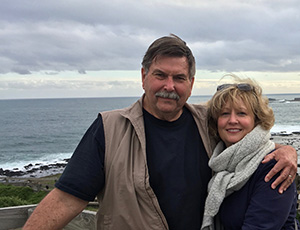

Rita Conrad meets Fiona the hippo at the Cincinnati Zoo in 2021.
It was just another evening commute for Rita Conrad in 2017 — until a crushing pain seized her upper back, followed by exhaustion and nausea.
Alarmed, Conrad visited the hospital, where cardiac imaging revealed she had suffered a heart attack but showed no blockages in the arteries. She returned home without knowing the cause of her heart attack. Conrad says the next five years consisted of frightening “episodes” of debilitating symptoms, dead-end emergency hospital visits, and misdiagnoses.
But when she saw a cardiologist from Loma Linda University International Heart Institute speaking about women’s heart health on local television, the 56-year-old Yucaipa resident says she immediately booked the appointment that enabled her to regain her quality of life.
It changed my life to constantly feel like I was having a heart attack and not knowing why, what was going on, or what to do about it.Rita Conrad
The cardiologist Conrad saw on TV, Purvi Parwani, MD, director of the Women’s Heart Health Clinic, treats women with heart disease who may not be diagnosed or are misdiagnosed due to unique symptoms and presentations.
“Women and men can experience heart disease very differently," Parwani says. "That's why our clinic provides specialized care tailored to women who have or are at risk for heart disease.”
Conrad’s initial heart attack condition is known as MINOCA (Myocardial infarction with nonconstructive coronary arteries). Symptoms were characteristic of vasospastic angina, a cardiac condition that predominantly affects women and occurs when the coronary artery supplying blood and oxygen to the heart abruptly spasms and narrows.
Patients with vasospastic angina don’t always feel chest pain when exercising, Parwani says — in fact, symptoms can flare up at times of rest, early in the morning, or late in the night.
“Because the condition does not have a very traditional presentation of how we have known ischemic heart disease, patients with these symptoms can get overlooked or disregarded,” Parwani says.
Before knowing about her condition, Conrad says she lived her days shrouded in fear of sudden death.
“It changed my life to constantly feel like I was having a heart attack and not knowing why, what was going on, or what to do about it,” says Conrad, who had to step away from a 30-year-long career in local government. “When I had severe episodes, I worried about dying, not waking up, or going on a trip somewhere and something happening. It was a serious emotional burden to always feel like something bad would happen and repeat myself at medical appointments.”
Conrad says she was grateful to connect with Parwani and learn about her heart attack caused by severe vasospasm. She also learned about vasospastic angina symptoms, treatment, and management tips. The knowledge has liberated Conrad to exercise without fear and track her triggers, such as stress and colder temperatures. Since taking the prescribed medication and learning about her condition, Conrad says she feels calmer and has experienced a drastic decrease in episodes.
I am glad Rita was able to find us to ease her symptoms and avoid experiencing possible severe heart attacks or heart failure in the future.Dr. Purvi Parwani
Now she is back to doing what she loves, like engaging in contract work and projects in city finance. In her downtime, Conrad travels the country in a motorhome with her husband of 14 years, Mike, visiting daughters, grandchildren, and grand scenery.

“I am glad Rita was able to find us to ease her symptoms and avoid experiencing possible severe heart attacks or heart failure in the future,” Parwani says.
Awareness of cardiac conditions that primarily affect women, such as vasospastic angina, is key to protecting oneself and loved ones, Parwani says. In addition, she says that raising awareness will also foster better, widespread care for women’s heart health.
“It is helpful to just know about the condition, next best steps, the consequences and risks, and your options,” she says. “Like anything else in life, if you have a plan for something, you will feel better and be prepared to respond.”
Parwani advises getting checked as soon as possible if something doesn’t feel right regarding your heart. At Loma Linda University International Heart Institute, physicians are committed to providing patients with compassionate, comprehensive, and personalized cardiovascular care. To learn more, please visit lluh.org/heart-vascular or call 1-800-468-5432 to book an appointment.
